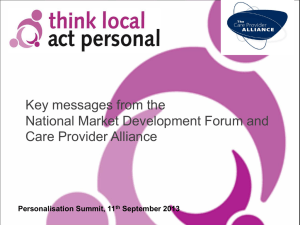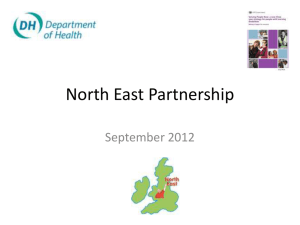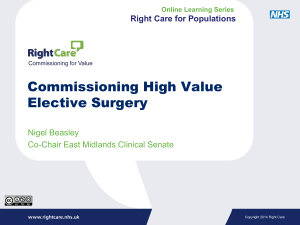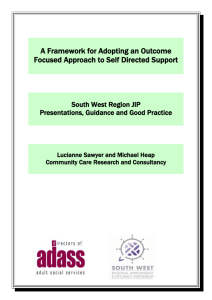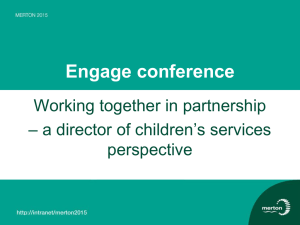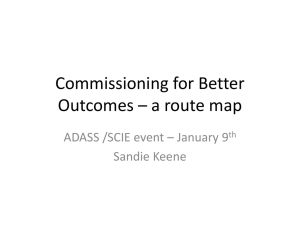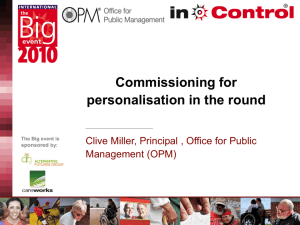Document
advertisement
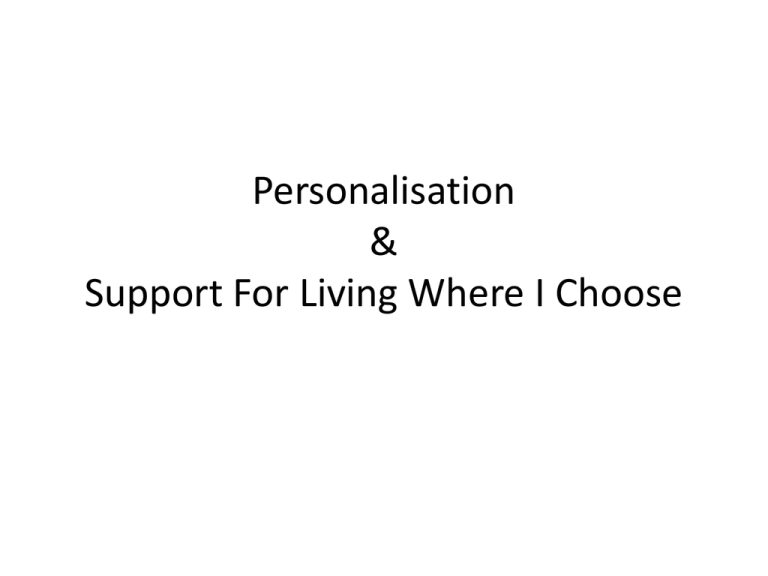
Personalisation & Support For Living Where I Choose What is personalisation? Principles of Community Care • • • • Dignity and respect Safeguarding / risk agenda Cost effectiveness Choice and control Personalisation: A history to date and value base A definition: Personalisation is the wholesale and radical change within the assessment and delivery process of social care and other publicly funded provision, notably health, which has at its heart the re-distribution of power and status between those who seek and receive services, commonly referred to as clients, users, patients and those who determine, assess, commission and deliver provision, professionals, such that the former have the right to choose and control WHO will deliver what they need/want together with HOW that will be delivered. Choice and control are the DNA of PERSONALISATION Cultural Changes • A shift from access to the uniform to access to the individualised • A shift from people as the passive recipients of professional expertise in assessment and commissioning to active, collaborative work with professionals • A shift from reliance on professional expertise and knowledge to a mutual respect and acknowledgement that the person is “expert” in their own life, by and large • A shift from block commissioning, the available, to individualised/micro commissioning, innovation • A shift from providing a service, excellent through to the abusive, to supporting people to improve/maintain the quality of lives and life chances, including aspirations • A shift from paternalistic risk aversive management of people’s experience to risk enablement, collaborative approach to assist people to get the life they want “I want a life Minister, not a service.” G Croft From Professional Gift Model to Citizenship Model Client/User/Patient as passive recipient of state benevolence Person as active citizen/fully engaged Professional and self-assessment (RAS) Cash resource at start of process not a “service” at the end Support planning, micro commissioning process Cash resource • Improving quality of life/death • Improving life chances • Outcome focussed What I want to achieve How I propose to spend my personal budget How you can best support me to achieve my goals What is important to me Do I want to manage my budget (with or without support) What outcomes will I achieve NO Direct Payment Notional Budget Managed Budget Provider development in a social market From tradition to transformation Personalisation = radical change in commissioning for Local Authorities, Primary Care Trusts, Clinical Commissioning Groups and vastly reduced control Public Organisations Traditional commissioning Block £££££ Community Care/PCT Budget £££££ Private In-house Voluntary Organisations Social Enterprises Provision of service Individualised Transformation Citizen commissioners Self Directed Support Splitting the atom of big budget beasts 4,000 personal budgets 4,000 potential micro commissioners / citizens What does this mean for us? How can I grow my business and reputation in a transformed culture of person-centred micro commissioning? Citizens of Walsall, Walsall Local Authority, Primary Care Trust and Clinical Commissioning Group need a high quality, cost effective, diverse and innovative collaborative market There is room for all good quality providers to serve 4,000 people with a personal budget plus people who fund their own service How will I market my organisation / self to reach potential customers? How will transformed innovative information replace our current offer? What will my organisation look like based on what people want? What values and behaviours drive my daily work and how can this be evidenced? What can I offer to improve life chances? What can I offer to enable people to be valued, less dependent and contributing to their community? Can I research niche markets to provide person centred outcome focussed solutions e.g. enablement, re-ablement, recovery, job coaching younger students leaving college, maintaining older people with more complex needs at home, challenging behaviour Can I support and mentor fledgling providers to complement a developing transformed market? How can I most effectively help to co-produce a vibrant social care market alongside users, LA, PCT, CCG and develop a “Community of Practice” How can I ensure that I and all staff have a good understanding of the local Safeguarding Agenda? Am I cost effective? How will a potential customer know? Risk in a personalised world • • No evidence to date that the adoption of a citizenship rights model of personalisation has led to any increase in reported incidents of abuse of vulnerable adults Much the same pattern of abuse as indeed with children exists pre and post transformation most abusers are already known to the victim, family, professionals, friends, neighbours are significantly most likely source of abuse, stranger abuse is comparatively rare No grounds for complacency – we have a shared responsibility for keeping vulnerable people safe Personalisation does not absolve any Agency of the “Duty of Care” Citizenship approach to risk From risk aversion to risk enablement • • • • • Crucial determinant is capacity Compromised capacity – Mental Capacity Act 2005, / DOLS The person is the “expert “in their own life Person should be allowed to make decisions, even unwise decisions providing the decision does not adversely impact upon any 3rd party causing them harm Risk enablement panels to support decision making process References • • • • • • • • “Making it Personal” Leadbetter C, Gallagher N, Portlett J Demos 2008 “Making it Personal: A Providers Journey from Tradition to Transformation Scown S, Sanderson H 2010 Personalisation: A rough guide” SCIE [2nd ED] 2010 Valuing People Series DH 2001 – 2012 Risk and Choice Framework DH 2007 Working Together for Change: Using person centred information for commissioning DH 2008 Commissioning for Health and Well Being: Glasby J, Policy Press 2012 Commissioning is an Era of Personalisation, chapter 11 Needham C, Duffy S • • • • Web sites www.in-control.org.uk www.scie.org.uk www.dh.gov.uk “Putting People First” Agenda DH 2007 • • Looks to a model of lifelong personal growth, development, supporting people through collaborative engagement to maximise their skills, abilities, develop new skills or re-engage with old ones reducing dependency, to maintain or improve quality of life and well being and be afforded all the rights and valued roles of citizenship. The most successful providers, irrespective of size, will, through the outcomes they achieve with people, actively embed this model in the daily round and common task of what their staff do and achieve THE END OF THE BEGINNING
